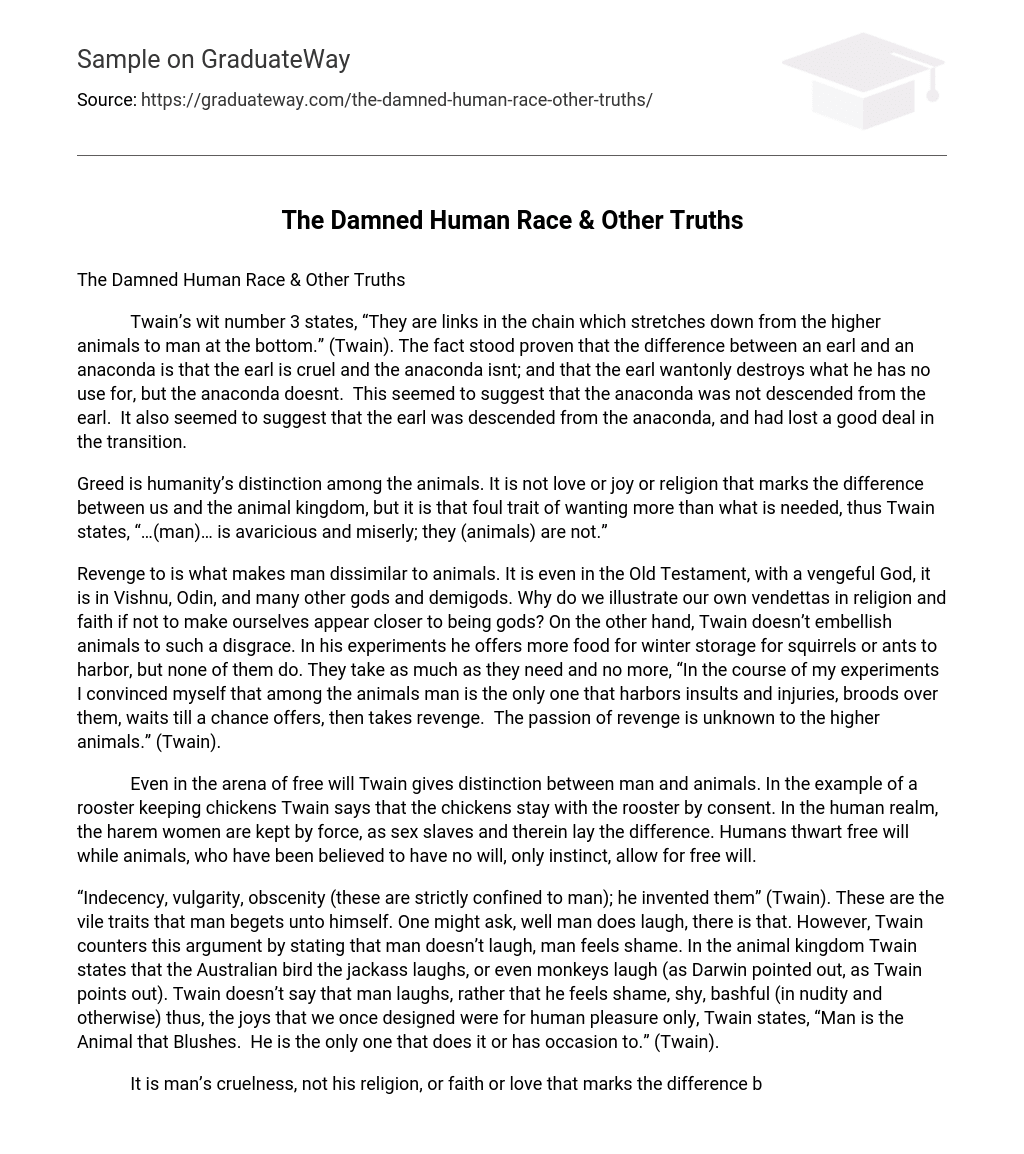Twain’s wit number 3 states, “They are links in the chain which stretches down from the higher animals to man at the bottom.” (Twain). The fact stood proven that the difference between an earl and an anaconda is that the earl is cruel and the anaconda isnt; and that the earl wantonly destroys what he has no use for, but the anaconda doesnt. This seemed to suggest that the anaconda was not descended from the earl. It also seemed to suggest that the earl was descended from the anaconda, and had lost a good deal in the transition.
Greed is humanity’s distinction among the animals. It is not love or joy or religion that marks the difference between us and the animal kingdom, but it is that foul trait of wanting more than what is needed, thus Twain states, “…(man)… is avaricious and miserly; they (animals) are not.”
Revenge to is what makes man dissimilar to animals. It is even in the Old Testament, with a vengeful God, it is in Vishnu, Odin, and many other gods and demigods. Why do we illustrate our own vendettas in religion and faith if not to make ourselves appear closer to being gods? On the other hand, Twain doesn’t embellish animals to such a disgrace. In his experiments he offers more food for winter storage for squirrels or ants to harbor, but none of them do. They take as much as they need and no more, “In the course of my experiments I convinced myself that among the animals man is the only one that harbors insults and injuries, broods over them, waits till a chance offers, then takes revenge. The passion of revenge is unknown to the higher animals.” (Twain).
Even in the arena of free will Twain gives distinction between man and animals. In the example of a rooster keeping chickens Twain says that the chickens stay with the rooster by consent. In the human realm, the harem women are kept by force, as sex slaves and therein lay the difference. Humans thwart free will while animals, who have been believed to have no will, only instinct, allow for free will.
“Indecency, vulgarity, obscenity (these are strictly confined to man); he invented them” (Twain). These are the vile traits that man begets unto himself. One might ask, well man does laugh, there is that. However, Twain counters this argument by stating that man doesn’t laugh, man feels shame. In the animal kingdom Twain states that the Australian bird the jackass laughs, or even monkeys laugh (as Darwin pointed out, as Twain points out). Twain doesn’t say that man laughs, rather that he feels shame, shy, bashful (in nudity and otherwise) thus, the joys that we once designed were for human pleasure only, Twain states, “Man is the Animal that Blushes. He is the only one that does it or has occasion to.” (Twain).
It is man’s cruelness, not his religion, or faith or love that marks the difference between humanity and the animals. Man is the cruelest animal, and all of the finery, civilization and schooling has not bred out our atrocities, “Man is the Cruel Animal. He is alone in that distinction” (Twain). The main point of this argument being that man engages in war, which is the ultimate atrocity. Even during battle, man cannot help but be vicious; he plunders, steals, rapes, and does this and uses war as the excuse that he will not be judged for such crimes because it was a time of war and therefore his actions are excusable. He uses this psychology as a gateway to a clear conscience. The cruel have no conscience.
Twain goes on to state that man is a slave, has slaves is the only animal that has done this – we don’t see cats make mice into their minions. Humans, even the wisest of us, rationalize this cruelty as in Aristotle making the difference between a natural and a legal slave. A legal slave is one who is caught during war and made into a slave and a natural slave is a man who does not have the countenance to be his own master and therefore must be mastered. This is man’s rationalization; even our philosophers agree. In this passage Twain speaks about self-reliance (indeed perhaps only our farmers can lay a close claim to being their own masters, dependent on no one but themselves and thus closer to animals in this respect than other vocations) and how man depends on slaves (companies, workers, and layman) in order to get jobs done. No man is rightfully belonging to his own time for he sells to others, unlike animals.
The reasoning that Twain gives to all of man’s fault is this: He suffers from Moral Sense, “It is the quality which enables him to do wrong” (Twain). We may think that moral sense allows us our civilization our propriety, religion, love, it is the thing that separates us from those savage animals. Considering Twain’s argument about war, how we commit war crimes, and allow testosterone to rule our actions, then such savagery as we have set aside for animals is indeed only for the human race. Our moral reason, our religion as an excuse to go to war since the beginning of our inception into the world, only goes to prove Twain’s point. Humans are cruel, and there is no one beneath us, not insect, wolf, salamander or chimpanzee; we are most assuredly alone in our cruelties.
Works Cited
Twain, Mark. Damned Human Race. 3 April 2009.
<http://jeromekahn123.tripod.com/logicalthreads/id14.html>





